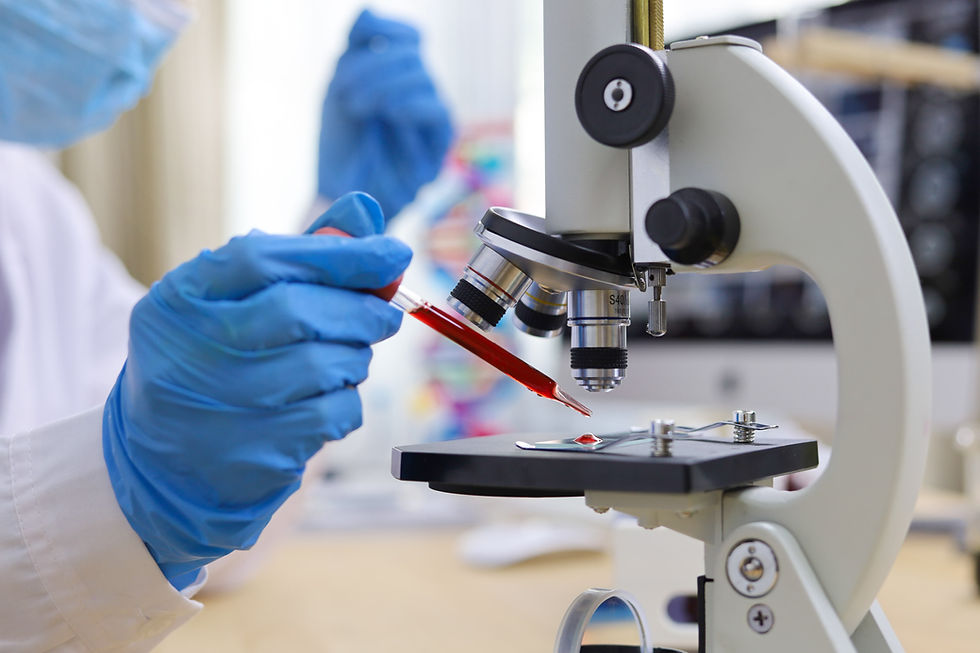The Lifesaving Role of Immunohematology: Insights from a Transfusion Consultant
- Ruchi Punamia
- Sep 30, 2023
- 3 min read
In the complex world of modern medicine, there is a crucial but often overlooked field that plays a pivotal role in saving lives: immunohematology (IH). As a transfusion consultant, I have witnessed firsthand the importance of immunohematology in ensuring the safety and efficacy of blood transfusions and I highly recommend anyone and everyone dealing with blood to be aware of this aspect of Transfusion Medicine.

Understanding Immunohematology
Immunohematology is a branch of laboratory medicine that focuses on the study of blood groups, blood antibodies, and their role in blood transfusions and transplantations. It plays a crucial role in ensuring that donated blood is compatible with the recipient's blood type to prevent adverse reactions and complications.
The Importance of Blood Typing :

One of the fundamental aspects of immunohematology is blood typing. Blood is classified into different groups based on the presence or absence of specific antigens on the surface of red blood cells. The most well-known blood group systems are the ABO and RhD systems. Determining a patient's blood type is essential before any blood transfusion to avoid incompatible transfusions that can result in severe reactions and also fatalities. However, it is worthwhile to note that the scope of this specialty is much beyond ABO and Rh systems. Many other blood group systems (eg: Kell, Kidd, MNS etc…) and HLA antigens have significant implications for transfusion and transplant safety which must also be tested in special circumstances.
Crossmatching for Safety :
Crossmatching is a crucial step in immunohematology. It involves mixing a sample of the patient's blood with a sample of the donor's blood to check for compatibility. This process helps to identify any unexpected antibodies in the patient's blood that may react with the donor's blood. Crossmatching ensures that the transfusion is safe and minimizes the risk of adverse reactions.
Preventing Transfusion Reactions :
Transfusion reactions can be life-threatening, and immunohematology plays a critical role in minimizing these risks. When incompatible blood is transfused, the recipient's immune system can recognize the foreign blood cells as invaders, leading to a range of adverse reactions, including hemolysis (destruction of red blood cells), fever, and organ damage. Immunohematologists ensure that the right blood type is matched with the recipient, reducing the chances of such reactions.

Managing Blood Inventory
Hospitals must maintain an adequate supply of blood products to meet the needs of patients. Another vital role of immunohematology is managing blood inventory including the blood groups and different components of blood(RBC, WBC, RDP, SDP, Plasma, Cryoprecipitate, etc) . Transfusion consultants are responsible for inventory management, including blood collection, testing, and storage, to ensure that there is enough safe and compatible blood and components available at all times, especially in emergencies and for patients with specific needs like those with rare blood types. The protocol must be in place, especially for Massive Blood Transfusion scenarios, to release the safest blood after weighing the risks vs benefits of each transfusion.
Transfusion Support in Special Cases
Immunohematologists are also instrumental in providing support for patients with unique transfusion needs, such as those with multiple antibodies (alloimmunized patients) or rare blood types. They use their expertise to find compatible donors and ensure that these patients receive the blood they require ie. best-matched blood, even when facing challenging circumstances.
Conclusion
Immunohematology is an indispensable field within healthcare that often operates behind the scenes but plays a critical role in ensuring patient safety during blood transfusions. As a transfusion consultant, I have witnessed the vital importance of immunohematology in matching blood types, preventing transfusion reactions, and managing blood inventory effectively. It is a field that requires precision, expertise, and dedication, as even the smallest error can have life-threatening consequences. So, the next time you or a loved one receives a blood transfusion, remember that behind the scenes, a transfusion consultant and immunohematologist is working diligently to safeguard your health and well-being.
Yours Truly,
Dr Ruchi Punamia, Founder and Author,
The Blood Blog (The Blood Community for All)
Join #thebloodblog community and #DonateSafeBlood campaign.
Follow us on all our social media handles. Tap on the link now. https://www.hopp.bio/thebloodblog
Let's spread the word and unite for blood wellness and awareness. Thank you for being a part of "The Blood Blog" family. Here's to the life-sustaining, community-binding, and awe-inspiring world of blood!
Fantastic , thanks for sharing and enlightening us